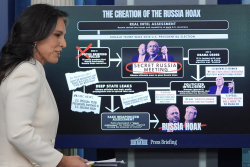Rare is the opera that continues to be performed in two languages, but the exigencies of the Paris Opera have imprinted that legacy on a handful of works. Many are mid-nineteenth-century Italian stalwarts that were introduced in French to conquer what Walter Benjamin identified as “the capital of the nineteenth century.”
We normally call Giuseppe Verdi’s great opera of religion and power Don Carlo, without the s. But with the added letter, the connoisseur knows he is getting the French version. The Italian composer first presented the opera with its original French libretto by Joseph Méry and Camille du Locle in 1867. He later revised it substantially in his native language for the Italian stage; its edition of 1884—retitled Don Carlo—is regarded as definitive. Curatorial exercises have occasionally restaged the French-language production in recent years, however, including a Metropolitan Opera production in 2022 and, in Paris, the Polish director Krzysztof Warlikowski’s production of 2017. The latter returned to the Paris Opera in Italian two years later and reverted to French for its revival this season. These variants were Paris’s first French-language performances of the opera since 1986.
The language does nothing to interfere with the plot, which Verdi adapted from Friedrich Schiller’s play Don Karlos, Infante von Spanien, a highly fictionalized dramatization of an episode in the long reign of Spain’s sixteenth-century King Philip II (r. 1556–98). In the opera, Philip’s son Carlos falls in love with and is betrothed to the French princess Elisabeth de Valois, but Elisabeth is then instead married off to Philip to secure a peace treaty.
Overshadowing both the personal and the political dimensions of the opera are the religious ones: the Spanish Inquisition looms, personified by the Grand Inquisitor, a pitiless cleric whose power is ahistorically portrayed as greater than that of Spain’s monarch (in reality, the Inquisition was an office of the Spanish state staffed by clerics who answered to the king).
Compared to the more familiar Italian libretto, however, the French version carries a perceptible change in mood. Philip’s mournful Act IV aria lamenting Elisabeth’s lack of affection, for example, begins “Elle ne m’aime pas,” or “She doesn’t love me,” a less profound sentiment than that expressed by the Italian “Ella giammai m’amò,”—“She never loved me.” Elisabeth’s cries for “Justice” when her affections for Carlos are exposed by theft sound weaker than her Italian cry for “Giustizia.” A courtier who has just saved his king from mortal harm would probably be more pleased with the inverted emphasis in “Marchese, duca siete!” rather than simply being informed, “Marquis, vous êtes duc.”
Warlikowski has updated Don Carlos to a fascisant mid-twentieth century, a predictable default for any work involving authoritarianism, regardless of era or ideology. The oppressive male characters are suited in official gray. The ladies’ dresses are inspired by the style of Jacqueline Kennedy Onassis. The royal court houses a gym with fencing pistes, a film-screening room, and a dark-paneled non-place where courtiers puff on cigarettes and try to maintain an air of savvy and discretion. Sometimes the visuals are at odds with the work. The opera’s climactic auto-da-fé scene unfolds in a bizarre parliamentary milieu, with tiered rows of seats to accommodate the medieval social orders that make little sense in the twentieth century.
Christian Van Horn is a fine bass who delivered Philip with a strong legato, but his relative youth and vigor belied the notion that Elisabeth would find marriage to him truly objectionable. Nor should Philip be naturally given to drink, as this production implies, even if some domestic abuse pokes through in the libretto. Likewise, Warlikowski’s presentation of the title character as suicidal detracts from his ardor and leaves him immune to heroism.
When Warlikowski’s production premiered in 2017, the cast was headed by the superstar German tenor Jonas Kaufmann and the rising Bulgarian soprano Sonya Yoncheva. Kaufmann’s voice, alas, is no longer what it was eight years ago, while Yoncheva has gone on to celebrated roles in other theaters. In this revival, the tenor Charles Castronovo did a credible if not exactly exciting job in the title role. Marina Rebeka, who is in the role of Elisabeth, has been on the scene for a long while. Her singing in younger years left me rather cold, but here she blossomed into preternatural wonder. Still more contemplative than expressive in the opera’s French version, she did not let linguistics stop her from coming alive in the difficult six-part final-act aria “Toi qui sus le néant.” As Carlos’s friend and fellow freedom fighter Rodrigue, Andrzej Filończyk never quite grasped the necessary tonalities. The Russian mezzo Ekaterina Gubanova came off rather better as Princess Eboli, a diabolical courtier who is at once Elisabeth’s treacherous confidante, Philip’s unfaithful mistress, and Don Carlos’s unsuccessful seductress. Does she really have the lesbian tendencies Warlikowski assigns her? Probably not. The Ukrainian bass Alexander Tsymbalyuk was reaching out of his depth as the Grand Inquisitor, a part that sits rather too low for his brighter voice.
Simone Young took time off from her various Wagner projects to conduct. Her reading was serviceable but too often glided over the grand moments.


















